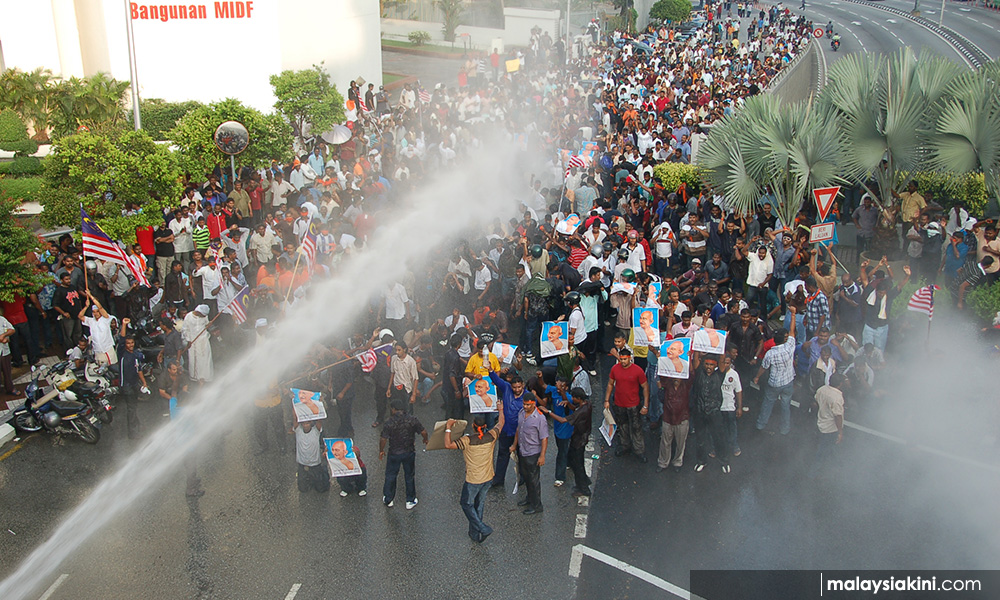
SPECIAL REPORT | It was not an ordinary Sunday on Nov 25, 2007. Something happened in Kuala Lumpur that morning.
After hearing about the incident, a youngster browsed through the recently-launched YouTube where some low-resolution videos caught his eyes.
The video showed Jalan Ampang barricaded by the police and well-equipped Federal Reserve Unit (FRU) personnel descending, squadron after squadron.
A continuous volley of tear gas followed and the city became a battlefield.
Tens of thousands of ethnic Indians, carrying posters of Mahatma Gandhi and chanting "Makkal Sakti" (people's power), were seen scrambling in all directions.
Some fled to KLCC after suffering from tear gas, batons and water cannons. There was much anger and panic.
"People are not able to demand their rights, is this democracy?" said a protester who was captured on camera, looking clearly outraged.
After watching the videos, the youngster felt an unexplainable excitement. It was a different kind of experience which he could not fully comprehend.
He felt that he was in the middle of something historic and spectacular. He heard voices crying for change.
The youngster was this author and the historic protest was the Hindu Rights Action Force (Hindraf) rally.
It took place a year before the global financial crisis and Malaysia's political tsunami in 2008.
It was a year highlighted by three major events, which helped define the changes that the country would undergo.
Two weeks before the Hindraf rally, on Nov 10, 2007, some 40,000 protesters gathered in Kuala Lumpur for the first Bersih rally, demanding for free and fair elections.
Dataran Merdeka was put under lockdown with a heavy police presence.
It was a cat-and-mouse game as police deployed water cannons near Masjid Jamek to disperse the "yellow wave".
Despite the chaos, PAS' Unit Amal formed human shields and help guide the crowds from Central Market, Sogo shopping centre and the National Mosque to submit a memorandum at the national palace, which was situated along Jalan Istana at that time.
Described as the largest rally since Reformasi in 1998, the Bersih gathering also served as a common platform for the opposition parties.
Apart from the Hindraf and Bersih rallies, 2007 was also known for the "Walk for Justice".
On Sep 26 that year, 2,000 lawyers marched from the Palace of Justice to the Prime Minister's Office to hand over the Malaysian Bar's memorandum.
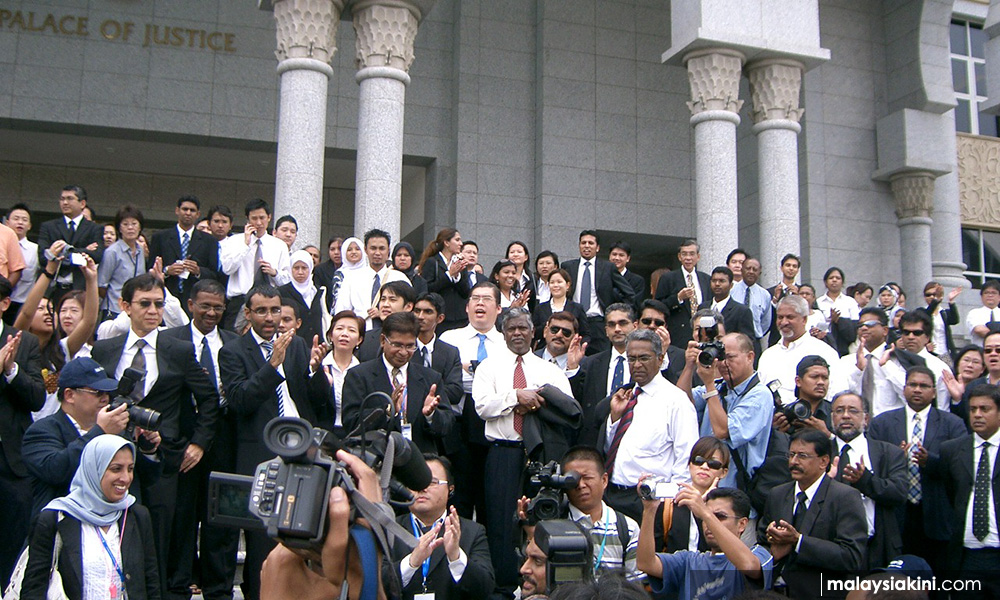
They called on the government to set up a Royal Commission of Inquiry (RCI) to probe allegations of judicial fixing and to establish a judicial appointments and promotion commission.
"Lawyers don't walk every day. Not even every month. But when they walk, then something must be very wrong," the then Malaysian Bar president Ambiga Sreenevasan had said during the protest.
It was only the third time in history the lawyers had marched. It was large and unprecedented.
Examining the three defining movements
The three social movements in the second half of 2007 can be described as a defining period that bridged the Reformasi era in 1998 and what was to follow after the 2008 general election.
bridges the past and the future, which inherited and transformed the decade-long strength accumulated since Reformasi in 1998, followed by another decade-long journey of political reforms after the 2008 polls.
It was a time that helped set the country on the path of democratisation.
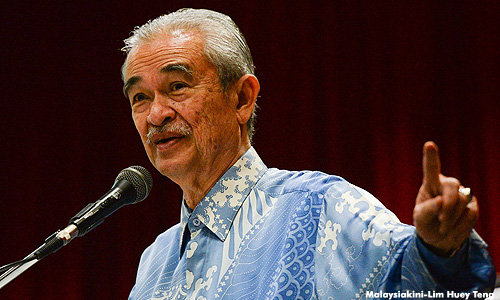
"Why was there an emergence of social uprising? Because authoritarianism was decaying," said Penang Institute fellow Wong Chin Huat.
"The three movements must be examined independently. The Malaysian Bar was upset that (former prime minister) Abdullah (Ahmad Badawi) did not punish the judicial abuses during the Mahathir era.
"Bersih rally was the collaboration between the opposition and civil society to fix the electoral system after going through a low ebb in 2004.
"Hindraf came about after the government turned a blind eye the right-wing and little Napoleans demolishing the Hindu temples, causing the wrath of the ethnic Indians.
“Abdullah was incapable of solving the social issues and the people were upset. In 2007, he was facing pressure from both sides. Reformists thought his reforms were insufficient and conservatives such as Mahathir thought he was too soft and bowed to dissidents,” he told Malaysiakini.
While most analysts attributed the rise of Hindraf to the demolition of temples, Edmund Terence Gomez, Universiti Malaya's professor of political economy at the faculty of economics and administration had a different view.
"The decline of the plantation (rubber) industry and the rise of the construction sector had forced the Indians out of the estates in the west coast of peninsular Malaysia.
"Selangor, Malacca, Perak and Negeri Sembilan... these are the states with huge Indian populations, primarily in the plantation sector. They have nowhere to go, jobless and became the new urban poor.
MIC was completely useless. And so from there, Hindraf emerged," he said.
After the 12th general election in 2008, a political realignment took place.
With the advent of social media, freedom of speech was no longer the privilege of the elites and the media.
Civil society became more robust, and social acceptance for street protests increased.
But following the 13th general election, the democratisation process was met with a major setback.
Fast forward today, the civil society has been struggling to pull itself together. There is much scepticism and lack of confidence whether genuine reforms are still possible.
For a time, the opposition was able to focus its efforts on changing the federal government but had avoided tough issues that affect the fabric of society, such as race and religion.
However, increasing, the opposition has had to confront such issues and an example of this coming to fore was PAS president Abdul Hadi Awang's motion to amend the Syariah Courts (Criminal Jurisdiction) Act (Act 355) was tabled, which had not only divided the people but also MPs within the opposition.
At the same time, the BN government became embroiled in a series of scandals and in an effort to deflect them, used the full force of the state machinery.
From the media perspective, veteran journalist Fathi Aris Omar (photo) noted that there had been a tightening of the media space.
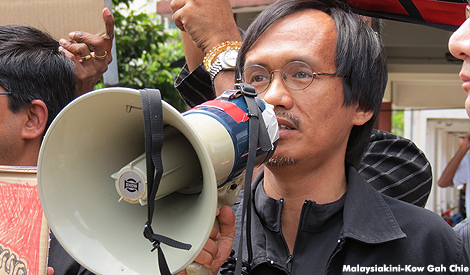
He said under the administration of Mahathir and Pak Lah (Abdullah), the now defunct Internal Security Act (ISA) was used as a weapon to silence the people.
Despite the absence of the ISA, Fathi noted Prime Minister Najib Abdul Razak was able to expand the regime's "big brother" role to include the internet.
"Najib has a few legal weapons. Firstly, the legal suits initiated by the prime minister himself. Secondly, the excessive use of the Sedition Act and Communications and Multimedia Act, where police go after critics.
Thirdly, blocking of news portals, such as Sarawak Report and The Malaysian Insider. We never saw such form of control of the Internet under Mahathir and Abdullah." he said.
Vacuum in the civil society
Fathi also pointed out that the jailing of Anwar Ibrahim would affect the opposition's preparation for the coming general election.
Instead of long-time opposition leaders stepping up, they have had to install Umno splinter party Parti Pribumi Bersatu Malaysia (Bersatu) to take the lead.
“Mahathir is old and Muhyiddin is no longer young, unlike Anwar back in the Reformasi days when he was in the early fifties, like Azmin Ali and Lim Guan Eng now," said Fathi.
Likewise, the civil society too appeared to struggle with having the right leadership.
Fathi said for years, the civil society was heavily reliant on the opposition and was unable to nurture their own leaders.
"People have to think beyond party politics. If the civil society wants to compete with the political parties, you must be as massive as the opposition. Otherwise, you cannot offer (anything).
"People have to think beyond party politics. If the civil society wants to compete with the political parties, you must be as massive as the opposition. Otherwise, you cannot offer (anything).
"How did the Hong Kong's Umbrella Revolution came about? It also happened in 1974 Baling protest where those from the opposition were absorbed by BN, and the students became the symbol (of resistance)," he said.
Despite the apparent gloominess, Fathi said to expect the unexpected in politics.
"No matter how gloomy you foresee the future, sometimes just like the Umbrella Revolution, things happen unexpectedly. I don't think even the Chinese regime expected that the students would occupy (Hong Kong city).
"That's why, in politics, it's very funny. No matter how much you analyse there will be unknown factors.
"But of course, you don't rely on these unknown factors. So you have to keep putting effort (in what can be controlled)," he said.
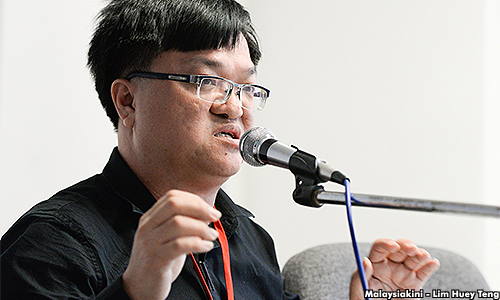
Meanwhile, Wong (photo) opined that as people are only concerned about "tomorrow and not the the day after tomorrow", they are now stuck and wandering at the crossroads of history, ten years after 2007.
He said "tomorrow" refers to the change of government, and "the day after tomorrow" would be the deep-seated social differences.
"The most profound issue of the day is not the inadequacies of the elites, but the fundamental differences in our society. We are unable to find a common goal for collective action.
"In 2007, we were in an old system that was declining. In post-2008, we are going through the pain of transformation. The old system is collapsing, but the new one has yet to be established.
"We are standing amid the ruins, feeling lost. You have no choice but to ask about the day after tomorrow. Once you do so, all issues will be out in the open such as new economic policy, the future of Islamisation.
"The differences between the opposition parties will aggravate," he said.
However, Wong said people should not to just complain and do nothing.
"History will not put on the signal light before making its turn. When you grab the opportunity, you will move with the wave. Even when you are down, do not underestimate what you can do.
"The exit is when you realise the situation and understand that you are responsible for part of the problems. You will know where to go when you view it in the long term.
"Some problems may not have solutions in the short term, but it does not mean you cannot do anything," he said.
Electioneering overshadows ideals
After the failure to capture the federal government in the 13th general election, the opposition appeared to have given more emphasis to political expediency over the ideals of reform.
One such perceived political expediency was its opposition to cooperate with former premier Dr Mahathir Mohamad.
Kuala Lumpur and Selangor Chinese Assembly Hall (KLSCAH) chief executive officer Tang Ah Chai was of the view that people were being "too romantic" and have the notion that all the problems will be solved once there is a change of government.
They put all their hopes on the opposition, he said.
"With the emergence of Mahathir and Bersatu, the main issue is whether we should still talk about political ideals? Or should we talk about political reality on how to capture votes and seats first?" he added.
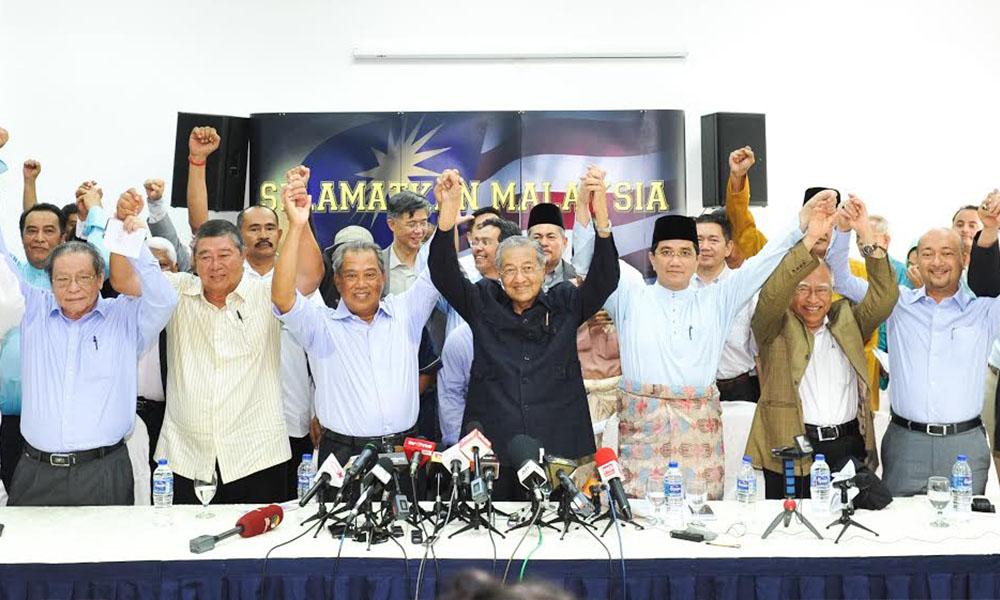
Tang said the old Umno forces led by Mahathir and the Reformasi generation represented by Anwar will face difficulties in reaching consensus and reconciliation.
He added it was better to understand why we want a change of government in the first place.
"The fall of our institutions was largely caused by Mahathir, but he never reflected on his decisions or apologised, nor did he talk about what reforms he will push for after being in power."
Tang said people have to go back to the initial intention, which was to discuss why political reform was necessary and how it can happen.
“A change of government is the common ground for the opposition, but it has to have a basis, which is to tell people what are the benefits of it, how to reform, and what are the exact policies which will be implemented after that.
"This vision must be told. It's not 'vote for me first and we will talk about reforms later'.
"The ruling parties need to be monitored and so does the opposition. When the opposition first took power (in several states), there was this 'honeymoon period', where people were tolerant and gave them the chance and time.
"It has been nearly ten years after the 12th general election (in 2008). The honeymoon period is over, the opposition ought to show their report card,” Tang added.
In view of this, former Suaram executive director Yap Swee Seng stressed the importance of civil society, citing the downfall of Park Geun-hye, the former president of South Korea.
"It was civil society rather than political parties holding vigil, gathering every week to force the president out," he said.
He also gave another example of Otpor!, Serbia's non-violent movement, where the civil society glued the fragmented opposition.
"The opposition parties were disunited in the 90s. Otpor! was strong and invited the opposition leaders to join a mega rally organised by the civil society. Otpor! asked the opposition to endorse the civil society agenda, and requested the opposition to elect one candidate to fight against then-president Mirko Marjanovic.
"The opposition parties had to compromise and nominate one common presidential candidate. When the civil society is strong enough, you will have the bargaining power, even the opposition will listen to you, because the votes are with you.
"When the people sieged the presidential palace, the armed forces cleared the path for them. Otpor! was strong and they toppled the regime through non-violence," he said.
In present day Malaysia, such a prospect appear dim.
However, the rise of the three social movements in 2007 too did not happen overnight. It was a result of decades-long struggles.
While some wallow in despair over the recent setbacks, it pales in comparison what leaders of the past movements have endured.
With the nation now at crossroads, the choices made by this generation will determine whether they will chart their own destination or is swept away by the tide.
This report is the first of a three-part series commemorating the 10th year anniversary of the social movements of 2007. A timeline of the events can be viewed here. -Mkini


No comments:
Post a Comment
Note: Only a member of this blog may post a comment.